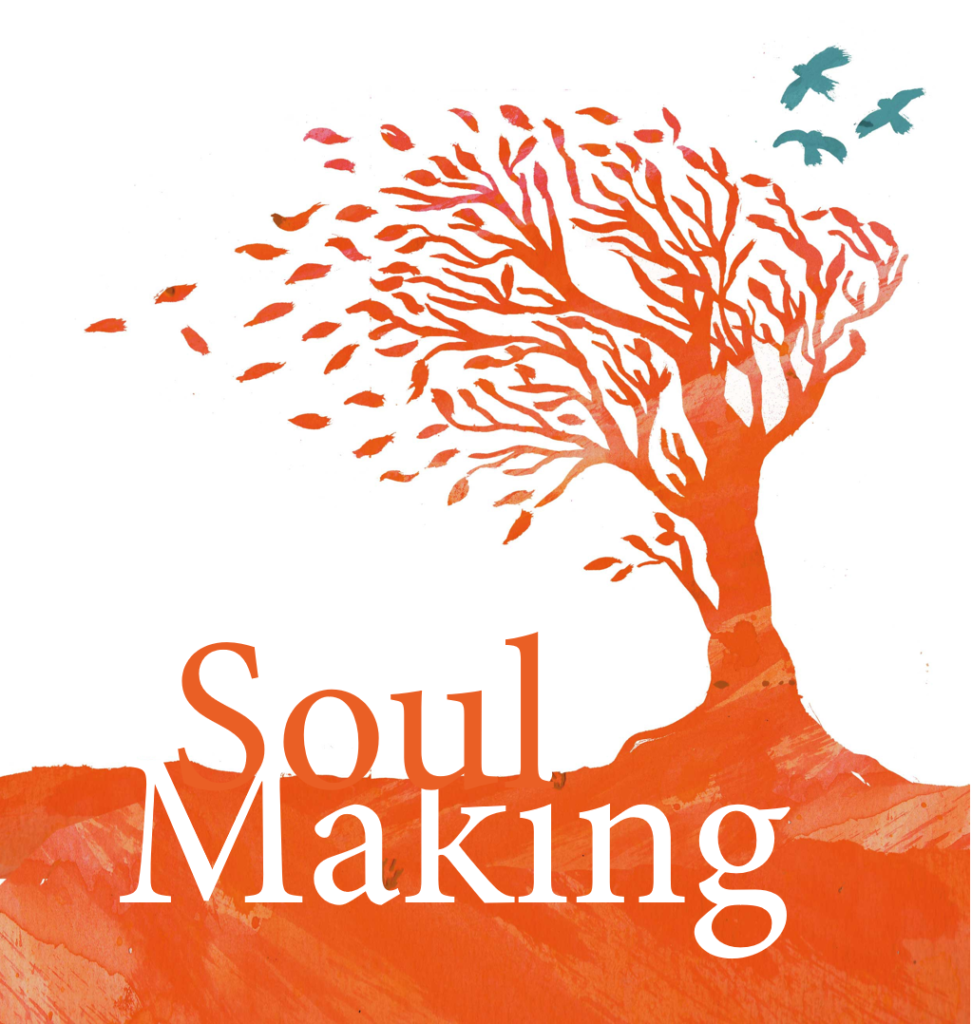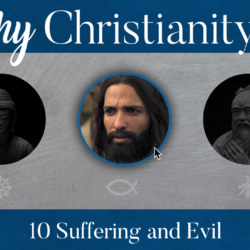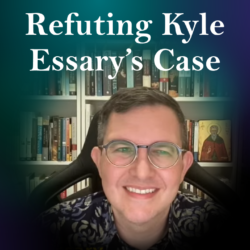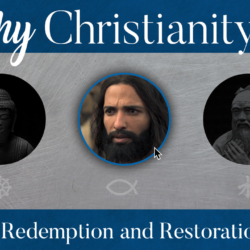This is the second part of a conversation where Jerry Wierwille challenges Brandon Duke’s soul-making theodicy. In particular, Wierwille raises the following questions:
- Why is hiddenness and epistemic distance considered a necessity for moral development considering the biblical examples where people experienced God and still retained their ability to make real moral choices either to obey or reject him?
- How can the four Ds (death, decay, deprivation, and damage) be considered good when scripture calls death itself God’s enemy?
- Considering that evil and suffering are not 100% effective in bringing about moral development and are in some cases even deleterious to that end, how can soul-making work as a thoroughgoing theodicy?

—— Links ——
- Leave a voice message via SpeakPipe with questions or comments
- Get in touch with Brandon Duke on his website: TruthBorn
- See other episodes with Jerry Wierwille
- Get in touch with Wierwille at his website
- More episodes and posts about the problem of evil and suffering
- If you’d like to support Restitutio, you can donate here.
- Intro music: Good Vibes by MBB Attribution-ShareAlike 3.0 Unported (CC BY-SA 3.0) Free Download / Stream: Music promoted by Audio







The noted Evangelical Clark Pinnock, in his book Most Moved Over: A Theology of God’s Openness, was right to say that “no being, not even God, can know in advance precisely what free agents will do, even though he may predict it with great accuracy.
Were he to know it, we would have to suppose that it is already determined that human freedom is illusory.
Our decisions would then settle nothing because there is nothing left to settle.
We would have no ‘say’ in the way things turn out.
Such omniscience would threaten our, and God’s, functioning as persons.
If history is real, the future must be open in ways that only creaturely decisions can close.
The idea that God knows every detail of the future is not taught in Scripture and is philosophically questionable.
Of course, God has the power to deal with every circumstance that arises but he cannot have, and does not need, total knowledge in advance of every detail.
God is a highly resourceful and capable person.
Not everything, including his actions, has been determined since before creation.
God is the living God who deals with situations that confront him, responding accordingly.
The reason the Bible often says that God ‘changes his mind’ is because he is working with finite agents, so that when one course of action proves futile he tries another.
How boring it would be for God to have to reign over a creation project, each molecule of which has its predestined place!
There would be nothing for God to do.
It is time to reconsider the alternative, which is very attractive.
Imagine the delight of genuine interactions and loving relationships, and the elements of novelty and surprise that a world with an open future would offer God!
Why not think of God as cognitively dependent on the world and his knowledge changing as history changes?
History is not yet completely settled but is still being actualized.
It has not been videotaped in advance.
The possibilities have not yet all become actualities.
God is still deciding exactly what he will do in matters of detail, but not overall.
Recall the dialogue between God and Abraham over the fate of Sodom, which had not yet been decided (Gen. 18); or the conversation between God and Moses over what to do with Israel now that she had become so resistant to grace (Exod. 34); listen to God asking himself what he is going to do next in Hosea 6:4.”
Ephraim, what will I do with you?
Judah, what will I do with you?
Your love is like a morning cloud, like the dew that vanishes quickly.
Hi Carlos,
I agree that open theism is the right way to think about God’s foreknowledge, and it does help us get some way towards explaining evil (in particular), suffering, and Gods’s hiddenness.
If we start with an assumption of open theism, we have good grounds that God has given man libertarian freedom, and that the exercise of such must be very important to God considering it’s risk and cost.
Soul making gives us the logical link to explain why God values that free exercise of moral capacity: it’s to develop us into morally mature persons, qualified to receive eternal life.
I think we are in agreement, that God must take on some risk to achieve his plan, which is why I think death, decay, damage, and deprivation are wise design choices, to get the most return for the risk, and limit the suffering as much as he can. I think hiddenness too, is God balancing his objectives, trying to make sure to give us enough revelation, whole still leaving us enough space to develop independently.
The sin of Adam was surely not inevitable ?
Sounds to me about right, Carlos. The sin of Adam surely could not have been “inevitable” ?
Thank you Mr. Duke, Mr. Wierwille, and Mr. Finnegan for putting together this series about soul making! This specific topic was something I had not thought of before, so I really appreciate being exposed to this idea!
I agree with Mr. Duke on much of what he said- for the time being anyway for it was a lot to absorb. It really resonated with me the idea that the consequences of are sin (which God determined) God also used for our good. And that the world would not function, and we would not develop if there were no physical consequences for our behavior. Oh and the patent-child analogy was really good!
The one thing I don’t quite see fitting in to this point of view are the verses that say Satan is the ruler of this age: John 14:30, 2 Cor 4:4, Rev 11:15, Eph 6:11-12. I know that God HAS to be ultimately sovereign- he determined there to be free will and the consequences of rebellion. But how does this correlate with Satan ruling the earth- is that also a necessary part of soul making?
And one more thing, hiddenness. From my current perspective God’s hiddenness today (things were different before the Bible was complete) has also to do with responsibility. We know the consequences of sin, we know what the Bible says so we do not need revelation to tell us what God want of us, and many times (not always) our physical problems are simply our own fault- this God is not responsible. I currently think these reasons for God’s hiddenness are also important. Soul making accounts only partly for God’s hiddenness it seems.
Feel free to correct and criticize!
Thanks again to Mr. Finnegan, Mr. Wierwille, and Mr. Duke!
God bless, Cate
Just a few disjointed thoughts having listened to the 2 episodes with Brandon and the 2 episodes with Jerry and Brandon —
Maybe I missed it, but I don’t think there was ever a clear explanation of what “soul making” is: what the process entails, how it ties in with Biblical concepts like redemption, forgiveness, sanctification, salvation, the work of Christ, the work of the spirit, etc., and what it’s ultimate goal is. I can’t help but wonder if “soul making” inevitably leads to universalism, recognizing of course my lack of a real understanding of what the phrase means.
The use of “moral intuition” always seems a bit weak to me. People from another place and/or time can have drastically different moral intuition from or own.
Brandon never really answered Jerry’s question on the necessity of God’s hiddenness to allow people to make truly free choice decisions for moral development. Brandon had indicated that if God “really” showed Himself (himself), that people could not reject Him. Jerry gave examples of God doing exactly that and yet the people still rejected God. There is a difference between someone not believing in God and someone rejecting God. [James 2:19 You believe that God is one; you do well. Even the demons believe—and shudder! ]
I think Jerry’s reply to the idea of death ultimately coming from God as opposed to some metaphysical impersonal principle was pretty weak. In the end, God not only explains the way things are set up, but He is the one that set things up — people die because He set things up that way. Having said that, I don’t think this would add any support to Brandon’s position.
A general thought about the use of analogy. It makes sense to me that analogies are good for clarifying and illustrating an idea or theological position, but cannot be used to PROVE an idea. After all, analogies are a dime a dozen. Calvinists, Arminians, open theists, etc ALL use analogies.
Brian,
All I really mean is that God is putting us through a process of moral development. The only reason I use the term “soul-making” is because it is used in the literature among the theologians and philosophers who discuss it. It is in contrast to Christians who believe that justification and sanctification are simultaneous events, Christians in particular from the Reformed wing of the Protestant reformation.
If you think we have to choose to repent of our sins, and that includes the process of changing ourselves to no longer commit the sins we are repenting of, you and I are on the same page. Really it’s just a repudiation of the doctrines of total depravity, bondage of the Will, once saved always saved, and other elements of the reformed systematic theology. It need not lead to universalism, although for some people it does. They read the prophecies of those doomed for the lake of fire the same way the prophecy for Nineveh played out, people might turn to God.
Now, once we accept that the process of ongoing repentance from sin moulds our character, and prepares us for God’s kingdom, we have the basis for creating a theodicy. That’s because the end goal of morally developed citizens for that kingdom, is a good that is both worth the evil/suffering we experience, and plausibly not achievable in any other way.
Regarding the need for some degree of divine “hiddenness”, my point is NOT that people cannot reject God to his face, or is my point that God must remain hidden so people aren’t overwhelmed to believe he exists.
My point is that the ongoing moral development, through free moral choices, needs some room for autonomy. That seems self evident, both from reading our bibles (God gives people very significant autonomy), and from our personal experience. It really is a truism that “what you do when you think no one is looking” is formative and reflective of your character. If we knew for certain, at all times, that God was present with us, it would be both undermining to that process, and creepy! Marital sex is a blessing from God, but we don’t imagine him in bed with us, or cheering us on! We need a little space to operate, is all I’m saying.
Otherwise, what possible reason could God have for not being fully present, permanently, with us from the moment of our birth to our death? This needs an answer, and if we do not offer one, the next one at hand is that he is not present because he does not exist.
I’m glad you agree that God is the one who sets the stage we occupy, including the conditions of death. But I would suggest that we need an explanation of why doing so, why setting these contusions, is right and loving for him. This takes us back to the original basis for developing a theodicy, we need reasons that explain why God would make a world such as this, and “moral development” (forget the term soul making of you like) gives us the logical basis for why each element needs to be present: the 4 D’s, and hiddenness.
I am somewhat distressed that after 4 hours I have neither come across clearly, nor been persuasive. At least if I accomplished the first, people could disagree on specific points and we could continue in dialog. Perhaps my note here will help, and I’d love to hear your additional feedback!
I’ve listened to all four of the podcasts concerning this idea of “soul-making”, or “moral development” in regards to evil and suffering. Brandon deserves huge kudos for digging into this subject to the degree he obviously has. And it is an important one for all the reasons mentioned…we all suffer to some degree or another in this age/life and most of us will be called upon to react to the pain and suffering that others experience. The conclusions we come to on this subject will inform those reactions.
But I also appreciate Jerry’s contribution to this discussion, and actually think I lean more toward his way of thinking. Allow me to add a couple other thoughts which will help explain why that is so.
We’ve thrown around ideas like a “morally developed people is God’s endgame”; and “God was the active agent in setting up this world to function the way that it does” (maybe not exact quotes, but close enough). These are assumed in the discussion to be obviously correct, but are they the best way of describing what’s going on? I would say not, and that this makes a difference. Two points which might add another dimension and flavor to this discussion:
1. How much moral development did humans have before “the fall”? How much are they supposed to have going into the future Kingdom of God? We talk about ideas of “perfection”, but what does that really mean? I suggest that children are not morally or ethically perfect in the sense of never making a moral error in judgment. Adam and Eve were children, even newborns. Isn’t God really looking for more of a sincere and transparent Father and child relationship, where the Father guides without smothering, and conveys his approval of our inherent worth as His children? He also exercises grace when we make mistakes in our growing process. And where the children worship their Father, hold Him in very high regard, believe Him, believe in Him, love Him with all their heart, soul, and mind…both unconsciously and consciously wanting to be like Him. Moral development is a result of that relationship, not the means to it. Therefore coming to love our Father, walking with Him, and becoming like Him through that relationship is the end game. Good things will follow as we seek Him more, and walk with Him. I believe this was the original intent, but we disconnected ourselves (via deception) from that when we traded the tree of life for the tree of the knowledge of good and evil. All the knowledge in the world won’t guarantee we will be like our Father. Without that connection to Him, we will fail to meet our potential.
2. God isn’t the active agent in making the conditions of this world we have found ourselves in since “the fall”. We are. A human mind connected to God in a Parent/child relationship via His spirit in us, will tend to think and act in predictable ways. A human mind disconnected from that relationship will tend to think and act in predictable ways, as well. Even how the children perceive themselves is dependent upon whether the above mentioned relationship exists or not. And how we perceive our Parent and our relationship with Him changes, as well. Yes, God created our minds to work this way…but that only makes Him a passive agent of the world we currently have; whereas we are the active agents. Who has primary culpability for the conditions of this age? We do. Our minds created them. Fortunately God works with the lemon to create lemonade. But that only works if we are again imbued with His spirit residing in our minds, bringing us back into the originally intended relationship. And for that to happen there are prerequisites like believing in God’s original purpose for us from Genesis 1 and restated and elaborated upon in the Gospel of the coming Kingdom of God; followed by repentance of disbelief and it’s resultant lawlessness, and baptism.
Therefore I don’t believe that the 4 Ds were ever meant to be the norm or necessary for development. He does not want the current age to be the way it is, but even in it He pursues us. Sometimes God intervenes, and sometimes He doesn’t. And how we respond to adversities is more important to God than finding or speculating on the causes.
By the way Brandon, I also am an Open View Theist! On that we definitely agree! You articulate that position very well.
Robin,
Thanks for the encouragement, and for evaluating the case I make.
I agree that not all Christians hold that “moral development” is God’s endgame, and perhaps in the future I will make a more specific argument for that, and AGAINST “imputed righteousness”. I think the doctrine of imputed righteousness is flat out wrong, and that both the Reformed and Lutheran traditions that hold to it should be rejected by Restorationist Christians.
Much of the push back I’ve heard has been from Christians that hold this doctrine, and thus don’t see a need for any “soul making”. It’s a fundamentally different idea of God’s plan for humanity.
https://en.m.wikipedia.org/wiki/Imputed_righteousness
Over the last two days I have listened to the four episodes on why does God allow suffering with Brandon Duke and Jerry Wierwile.
You introduced me to some new words and described various positions people have taken in their attempt to understand God in relation to this topic. Nnce I got my head around some of these things I began to appreciate the breath and scope that this subject matter can cover. Topics like God’s foreknowledge, the roles of God and man with regard to Faith,
and others.
However the thing that struck me the most is that no body made an reference to the Devil who is the main cause of all this suffering. I appreciate that you were discussing the question of Why does God allow suffering but it seems negligent to ignore the role the Devil has in this area.
You touched upon the suffering of Job, it is one of the most clear sections of scripture that shows it was Satan who was behind Job’s troubles and we see God gave the Devil the permission to inflict that suffering. 2 Co 4:4 states that the Devil is the god of this age, the prince of the power of the air.
So if the question is Why does God allow suffering then one should include in this conversation why does God allow the Devil the freedom to operate as he does, which is to steal kill and destroy. I think ultimately it does come down to free will which show what a powerful force God wove into the phycological DNA of both man and spiritual beings ie Angles and Angles who became demons.
Thanks for listening!
I’d suggest that 2 Cor 4:4 is NOT saying God has delegated authority to satan, or abdicated his role as God of this world. I’d suggest that instead, Paul is saying that this world chooses satan as their god, in direct rejection of the actual authority God maintains.
So, why does God allow satan to rebel against him? Simply, I think for the same reasons God allows us to rebel against him.
But I was taught the Satan has authority over the world.
Isn’t that why Jesus and Paul call him “the prince, ruler” (John 12:31; Ephesians 2:2)?
But the Devil has been spiritually defeated by Christ’s the resurrection. Praise God!
Hi, enjoyed pondering these discussions about why the world is how it is. It seems odd to me that (maybe I missed it) no one spoke about the primary setup of the Garden with A&E. The serpent didn’t sneak in to this idyllic beginning where everything was perfect – good, as God said! He/it was placed there, the two trees were placed there. A&E never had a chance against this ‘spirit of the power of the air’. IOW, it was always intended to go this way.
Only by the full experience and horror of sin could man finally choose the way of good – permanently. God planned it so, wasn’t Jesus slain ‘from the foundation’? That was plan A and there was no other needed. All the talk of trying to explain why the world is full of the 4D’s and this seemed to never be the foundation for an answer.